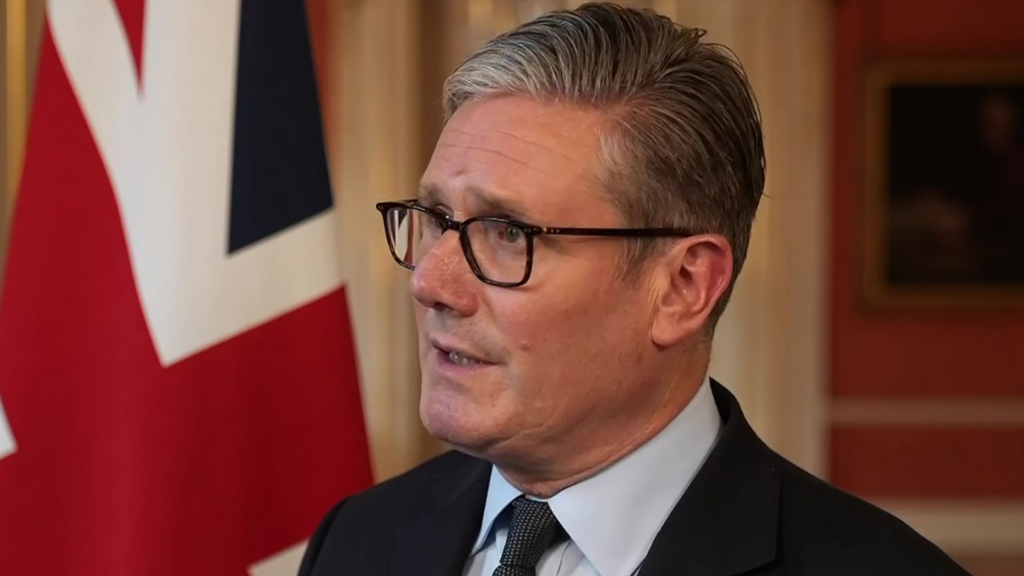Prime Minister Sir Keir Starmer has urged de-escalation following Israeli airstrikes targeting Iranian nuclear and military facilities.
Following a Friday afternoon conversation with Israeli Prime Minister Benjamin Netanyahu, No. 10 reported that Sir Keir conveyed the UK’s serious concerns regarding Iran’s nuclear program, as a new wave of Israeli strikes commenced in Tehran.
Warnings of retaliatory action from Iranian Supreme Leader Ayatollah Ali Khamenei, coupled with reports of Iranian drone launches, have heightened fears of a wider conflict.
Earlier, a Cobra emergency meeting convened to coordinate the UK’s response to the unfolding crisis.
In a social media post, Sir Keir stated he had been working with international partners to de-escalate tensions, advocating for restraint, calm, and a return to diplomatic solutions.
A No. 10 spokesperson, summarizing Sir Keir’s call with Netanyahu, stated: “The Prime Minister affirmed Israel’s right to self-defense and outlined the UK’s grave concerns about Iran’s nuclear program. He reiterated the need for de-escalation and a diplomatic resolution to ensure regional stability.”
Sir Keir also engaged in discussions with French President Emmanuel Macron and German Chancellor Olaf Scholz on Friday morning, issuing a joint call for diplomacy.
A Downing Street spokesperson stated: “The leaders discussed long-standing serious concerns about Iran’s nuclear program and urged all parties to refrain from further escalation that could destabilize the region.”
Regarding UK involvement in nuclear talks, the spokesperson stated: “Iran’s nuclear program is more advanced than ever, posing a clear threat to international peace and security. We’ve urged Iran to engage with diplomatic solutions and continue to liaise closely with our partners. We remain committed to a diplomatic resolution but are prepared to utilize all diplomatic means to prevent Iran from developing nuclear weapons, including the snapback mechanism if necessary.”
The UN snapback mechanism would reinstate international sanctions against Iran’s nuclear weapons development, sanctions lifted in 2015. Further details on the snapback mechanism can be found here.
Foreign Secretary David Lammy cancelled a planned trip to Washington D.C. to instead engage in discussions with his Iranian counterpart, describing the situation as a “moment of grave peril in the Middle East”.
In a press briefing, Lammy confirmed the UK was uninvolved in the Israeli strikes, emphasizing that Israel acted unilaterally.
UK officials confirmed non-participation in the overnight action but continued monitoring of the situation.
Conservative leader Kemi Badenoch declined to condemn Israel’s actions, highlighting Iran’s hostility towards the UK and past terrorist activities. She stated, “If Israel is preventing Iran from acquiring nuclear weapons, they should not be condemned.” Badenoch also advocated for increased UK defense spending and energy security.
Senator Marco Rubio also confirmed Israel’s unilateral action, stating on X that the US was not involved in the strikes and prioritizing the protection of American forces in the region.
The attacks mark the most significant assault on Iran since the Iran-Iraq war of the 1980s.
Israeli Prime Minister Benjamin Netanyahu declared that Israel had struck at the heart of Iran’s nuclear enrichment and weaponization programs, adding that the operation would continue until the threat was eliminated.
Iranian state television reported the deaths of high-ranking military officials, including General Mohammad Bagheri.
Liberal Democrat leader Sir Ed Davey called for strong international leadership from the UK government, stating, “The UK must work with allies to contain Iran’s nuclear ambitions through diplomacy, not war.”
Subscribe to our Politics Essential newsletter for in-depth political analysis, UK-wide insights, and updates on major political developments delivered daily to your inbox.
Israel’s ongoing wave of strikes against Iran, initiated Thursday night, continues. BBC Verify’s Merlyn Thomas has analyzed footage of the attacks and assessed the resulting damage.
Maps and imagery reveal the extent of Israel’s most significant strike on Iran and its nuclear facilities in years.
Among the casualties is General Mohammad Bagheri, Iran’s highest-ranking officer.
This new Middle East crisis presents a significant challenge to the US president’s diplomatic initiatives.
According to Frank Gardner, Israel’s Operation Rising Lion surpasses previous operations in scale and ambition.

